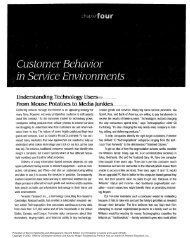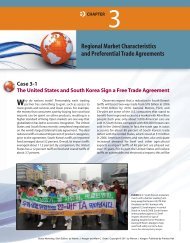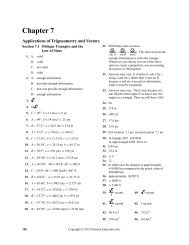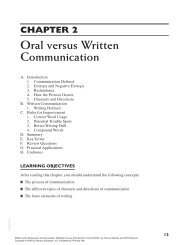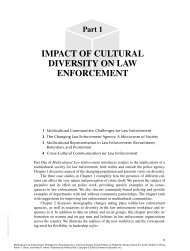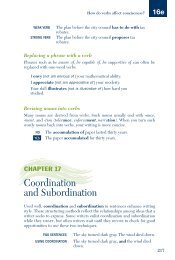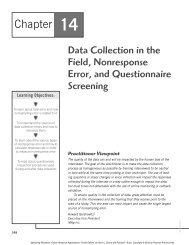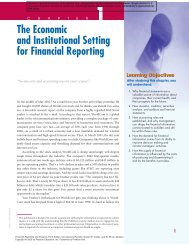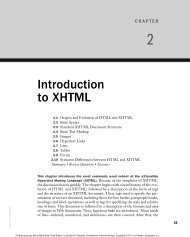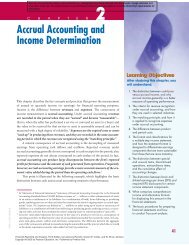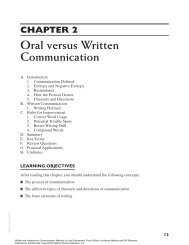MANAGEMENT COMMUNICATION - Pearson Learning Solutions
MANAGEMENT COMMUNICATION - Pearson Learning Solutions
MANAGEMENT COMMUNICATION - Pearson Learning Solutions
Create successful ePaper yourself
Turn your PDF publications into a flip-book with our unique Google optimized e-Paper software.
Chapter 3 ● Communication Ethics 91000200010270582216Spinning WorldCom ExecutivesIn May 2004, Citigroup agreed to pay $2.65billion to settle class-action suits related to itsrole in the collapse of WorldCom. Plaintiffs inthe suit alleged that SSB wrongfully providedfavorable ratings on the company. Telecomanalyst, Jack Grubman, provided the coverage.WorldCom was not downgraded to“neutral” until WorldCom lost 90 percent ofits value. The U.S. House of RepresentativesFinancial Services Committee additionallyfound that Grubman warned WorldCom executives,in advance of public disclosure, thatCitigroup was dropping the stock from therecommended list. 13A former U.S. Attorney Generalappointed examiner alleged that BernardEbbers, WorldCom’s chief executive officer,violated his fiduciary duties by passing over$100 million of investment banking businessto SSB in exchange for allotments of IPOstock shares. Ebbers was the chief executiveduring the time when massive accountingfraud and questionable personal loans werediscovered. WorldCom subsequently restatedearnings by $17.1 billion in 2001 and $53.1billion in 2000. 14The End of Japanese Private BankingCitigroup is the largest and oldest foreignownedbank in Japan. The history of theiroperations dates back to 1902. The operationsin Japan are some of the largest outsideof the United States for Citigroup. Bank officialsat Japan’s Financial Services Agencybegan investigating Citigroup transactionslinked to money laundering, as well asloans that were used to manipulate publiclytraded stocks. The FSA warned Citigroupin 2001, but little corrective action wasperformed.In December 2004, Citigroup washanded the damaging news that the FSA wouldterminate all private banking operations inJapan. This included a requirement to closeover 5,000 bank accounts. The FSA cited thecorporate culture and governance for theinfractions. Citigroup executives blamed theproblem on the unclear reporting structure forkey executives in Japan. Heads of divisionsreported to different bosses in New York. Inaddition to the lost earnings, the closing of thebank accounts represents a challenging blow toCitigroup’s image in Japan and threatens theconsumer and corporate banking units stilloperating in the country. 15Financial Effects of the CorporateScandalsBy the end of 2002, the effects of thevarious allegations were weighing heavily onCitigroup. The SEC, FTC, NASD, the NewYork State Attorney General and other agencieshad performed investigations. Thereserves set aside for still outstanding legalliability grew by billions because of the costsof regulatory and private litigation.During 2002, the year that many ofthese issues were discovered, the companylost over 30 percent of its market value.In May 2003, Citigroup dropped coverageof 117 firms and fired seven of its topanalysts. There was an increasing numberof analyst layoffs up and down Wall Street.J. P. Morgan, Goldman Sachs, and MorganStanley cut up to 25 percent of their researchstaffs. 16In 2005, the Federal Reserve publiclyannounced that it would not approve anymajor Citigroup Mergers and Acquisitionsuntil the company resolved these variousissues. This unusual warning from theFederal Reserve was especially restrictive toCitigroup because some analysts believedthat big acquisitions were the only way tocontinue the aggressive growth. 17Management Communication: A Case-Analysis Approach, Fourth Edition, by James S. O'Rourke, IV. Published by Prentice Hall. Copyright © 2010 by <strong>Pearson</strong> Education, Inc.



